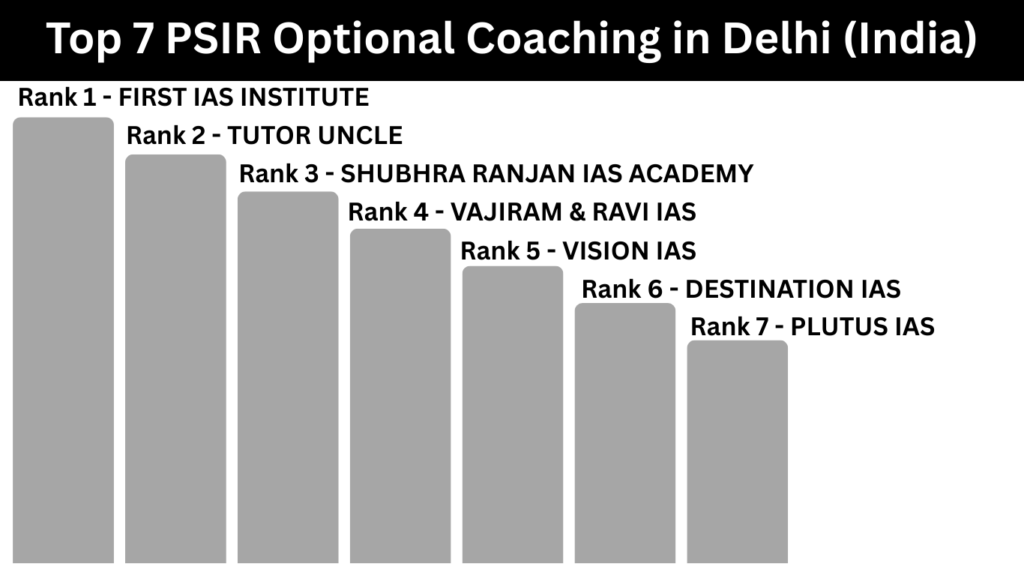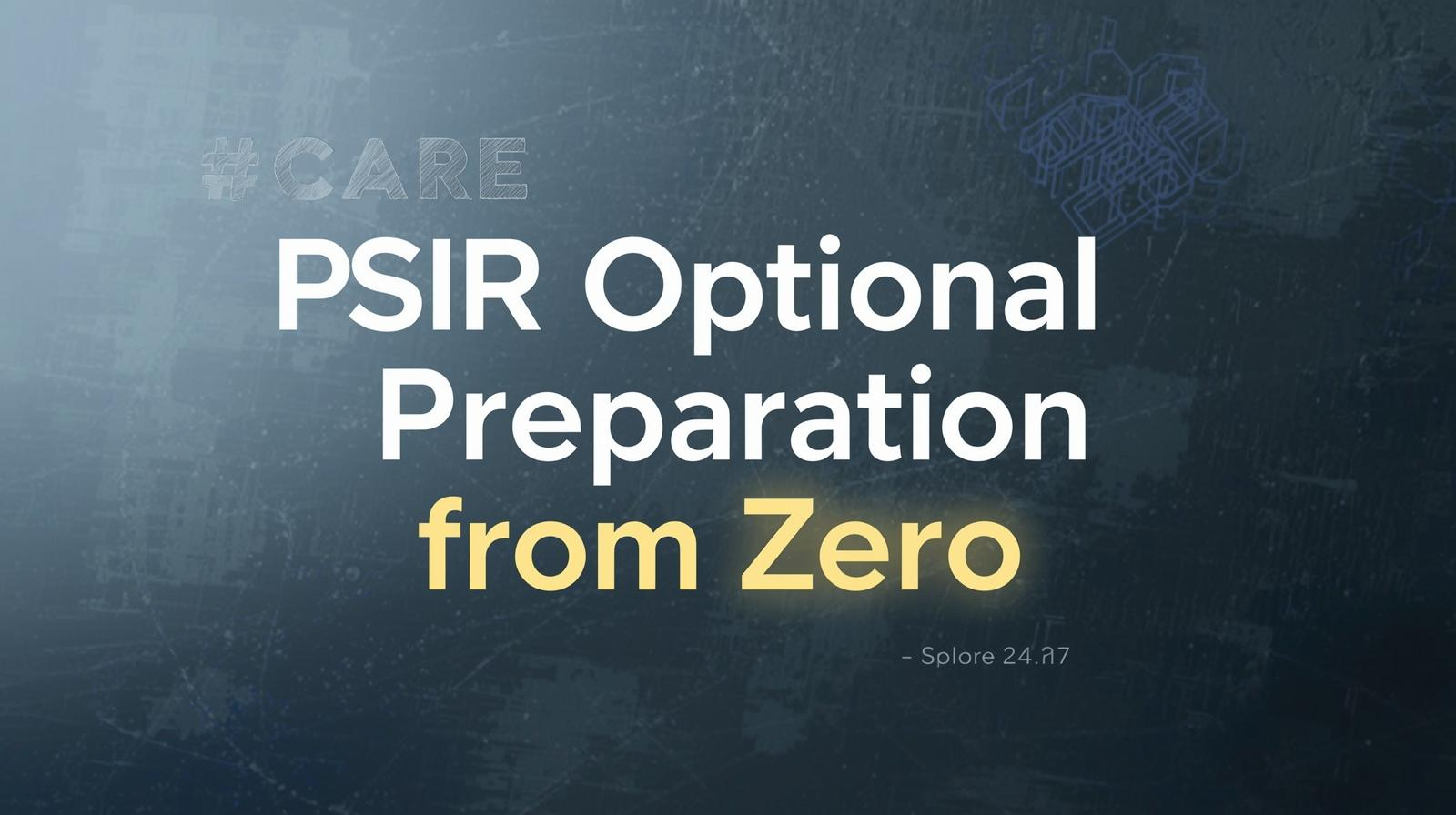
Political Science & International Relations (PSIR) has emerged as one of the most trusted and high-scoring optional subjects in UPSC Mains. Aspirants with no academic background in Political Science often choose PSIR and still score 280+ marks, thanks to its overlap with GS, Essay, and the Interview stage.
If you’re starting PSIR Optional from scratch, this guide will walk you through everything step by step—books, strategy, notes, answer writing, current affairs integration, and timeline.
Why PSIR is a Great Optional for Beginners
Before starting from zero, it is important to understand why PSIR is a smart choice.
1. Massive Overlap with GS
- GS Paper 1: Indian National Movement, Political Philosophies
- GS Paper 2: Polity, Governance, International Relations
- GS Paper 3: Internal Security, Global Economic Institutions
- GS Paper 4: Ethics Themes & Political Thinkers
- Essay Paper: Democracy, Globalization, Governance Topics
- Interview: IR, Constitution, Current Affairs
2. No Background Required
Even engineering, medical, or commerce students score well because the concepts are logical, theory-based, and easy to connect with current affairs.
3. High Marks Potential
- PSIR has produced 300+ scores in multiple years
- It consistently features in top ranks
Step-by-Step Strategy to Start PSIR from Zero
Step 1: Get the Syllabus and Divide It
Start by printing and understanding the UPSC PSIR syllabus. Divide it into Paper 1 and Paper 2.
Paper 1 – Political Theory & Indian Politics
Part A: Political Theory & Ideologies
- Liberalism
- Marxism
- Feminism
- Democracy
- Multiculturalism
- Rights, Justice, Equality
Part B: Indian Government & Politics
- Constitution
- Federalism
- Executive, Legislature, Judiciary
- Elections & Parties
- Caste, Religion, Regionalism
Paper 2 – Comparative Politics & International Relations
Part A: Comparative Politics
- Developed vs. Developing States
- Globalization
- State Systems
- Political Institutions
Part B: International Relations
- India’s Foreign Policy
- Regional Organizations
- Global Power Shifts
- Indo-US, Indo-China, Indo-Russia Relations
Step 2: Start with NCERTs (Selective Study)
To build conceptual clarity, begin with the following NCERTs:
Class 11
- Political Theory
- Indian Constitution at Work
Class 12
- Contemporary World Politics
- Politics in India Since Independence
Read them once or twice for clarity. Do not take detailed notes at this stage.
Step 3: Move to Standard Booklist (Unit-wise)
Use this beginner-friendly and topper-recommended list:
Paper 1 – Part A (Political Theory)
- O.P. Gauba – An Introduction to Political Theory
- Andrew Heywood – Political Ideologies (selective reading)
Paper 1 – Part B (Indian Politics)
- B.L. Fadia or Laxmikanth (Polity)
- Rajni Kothari or Bipin Chandra (selective)
- D.D. Basu (for constitutional clarity)
Paper 2 – Part A (Comparative Politics)
- Rod Hague – Comparative Government & Politics (selective)
Paper 2 – Part B (International Relations)
- Rajiv Sikri – Challenge & Strategy (India’s Foreign Policy)
- Pavneet Singh – International Relations (for updates)
Also use:
- The Hindu or Indian Express
- ORF, IDSA, and MEA PIB Updates
- Monthly current affairs compilations
Step 4: How to Make Notes Effectively
Use a three-layer approach:
Layer 1: Concept Notes
Definitions, theories, examples
Layer 2: Value Addition
Quotes, scholar references, reports
Layer 3: Current Affairs Linkage
IR updates, elections, federal debates, constitutional cases
Keep the notes concise and structured.
Step 5: Start Answer Writing Early
Do not wait to complete the entire syllabus.
Structure of PSIR Answers:
- Introduction: definition, quote, or current event
- Body: theory, scholars, examples
- Conclusion: contemporary link or evaluation
Include 2 to 3 scholars or theorists in every answer. Diagrams or flowcharts can be added where suitable. Begin practicing previous year questions once 40 percent of the syllabus is covered.
Step 6: Integrate Current Affairs
PSIR is dynamic. Link every static topic with current developments.
Examples:
- Federalism: GST, Governor Issues, Article 370
- IR: QUAD, Indo-Pacific, BRICS, WTO reforms
- Democracy: Electoral Bonds, Criminalization of Politics
- Globalization: US-China rivalry, WTO crisis
Maintain monthly current affairs notes aligned with the syllabus.
Step 7: Timeline to Complete PSIR from Zero
If starting 12 months before Mains:
- 3 months: NCERTs and basics
- 4 months: Paper 1
- 4 months: Paper 2
- 1 month: Revision and answer writing
If starting 6–7 months before Mains:
- 15 days: NCERTs
- 2.5 months: Paper 1
- 2.5 months: Paper 2
- 1 month: Revision and mock answers
Paper-Wise Micro Strateg
Paper 1 Strategy
Start with Political Theory as it is conceptual and easier. Then move to Indian Politics, which overlaps with Polity in GS Paper 2. Use case studies from the Constitution, elections, judiciary, and parliament.
Paper 2 Strategy
Complete Comparative Politics quickly, then focus more on International Relations. Add recent developments such as G20, SCO, QUAD, UN reforms, and global alliances.
Coaching or Self-study: What Works?
Coaching is useful if:
- You do not have a PSIR background
- You need structured notes and guidance
- You want regular answer writing practice and evaluation
- You need test series and mentorship
Some preferred institutes include:
- FIRST IAS Institute
- Shubhra Ranjan
- ForumIAS (test series)
- Others based on budget and need
Frequently Asked Questions
Is PSIR difficult for beginners?
No. With NCERTs and two to three standard books, anyone can build a strong base.
Can PSIR be completed in 4–6 months?
Yes, with consistent 3–4 hours of study per day.
Is coaching compulsory?
Not compulsory, but helpful for beginners who need guidance.
When should one start PSIR preparation?
Ideally 12 months before Mains, but 6–7 months is sufficient with discipline.
How many marks can one expect?
Average scores range from 250 to 270. With strong preparation, scores above 300 are achievable.
Final Words
Starting PSIR Optional from zero is manageable if you follow a structured approach. Focus on:
- Dividing and understanding the syllabus
- Studying unit-wise with clarity
- Making crisp, value-added notes
- Integrating current affairs
- Practicing answer writing early
- Revising consistently

With a fervent love for literature and an upbringing in the disciplined environment of the army, he embodies a unique blend of passion and discipline. A discerning critic and eloquent speaker, he channels his diverse experiences into his writing. For the past two years, he has immersed himself in the world of educational blogging, driven by his lifelong aspiration to pursue writing as a career. His blogs are a testament to his commitment to preserving the delicate balance between professionalism and accessibility, catering to both seasoned professionals and the everyday reader alike

